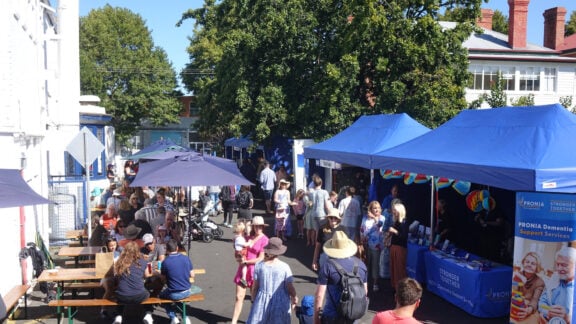Greek Orthodox Easter would have to be my favourite time of the year. It reminds me of how blessed I am to have been born into a rich culture that cherishes faith, family and food.
Since I was a young girl, I have loved Holy Week and have fond childhood memories of this powerful, moving and humbling period that is filled with so many Greek traditions, customs, pride and joy.
What separates Greek Easter from the rest of the year for me is knowing that this week is purely dedicated to church and family – starting Palm Sunday and ending Easter Monday – there are no other major plans or events scheduled into our family calendar.
And unlike Christmas, which can become chaotic and stressful, I find Easter to be a time of peace, where I can take time out to reflect and understand why this is such a spiritual and meaningful time.
My parents were never strict on fasting for 40 days but they always taught my brother and I to do our best. However, we knew during Holy Week there would be no meat, dairy, eggs and on Good Friday, not even olive oil in Mum’s home-cooked meals for us.
This of course made it all the more fun when Saturday night came around and after midnight mass, we were able to eat as much lamb, tsoureki, koulouria and eggs as we wished.
During Holy Week, in Greek households all around the world there are lots of beautiful foods being baked. I remember my yiayia, my mum and all my aunties in my yiayia’s kitchen- with their lovely production lines of dyed red eggs, tsourekia and koulouria. My cousins and I would be there watching and helping them make all the delicious Easter treats, which would be served after midnight mass.
These are the family traditions and customs I value and want to pass on to our daughter Nikoleta. She is only two-and-a-half; however, this week she has been in the kitchen with Yiayia Niki and mummy – watching, learning and helping us make the dough for the tsourekia and koulouria. Yiayia also had her grandchildren – Nikoleta and my nephews, making some dyed Easter eggs and they loved it.
Seeing the smiles on their faces and curiosity in their eyes makes this time of year even more special for me now. And I can’t wait for Saturday night, to take Nikoleta to her first midnight mass.
I remember, as a child, my parents putting us to bed during the day for a quick nap, so we were refreshed and energetic enough to last for midnight mass and dinner. This is what my husband and I are hoping to do with Nikoleta each year. I figure the wonderful experiences and memories in the long run will far outweighthe lack of sleep for a young child, one night a year – and we do have Greek blood after all – so really, no need to justify late nights here!
To paint an even clearer picture of my Easter experiences for you, I should also mention I was very lucky to have been brought up in a large Greek family. My parents live in the same street as my mum’s twin sister, her eldest sister and her brother- so there are four siblings in total that live within 200 metres of each other. Not to mention the koumbari and other family friends in between- so all up there are 12 Greek families in the same street – yes, it’s like a small Greek village in the south of Sydney.
They live 10 minutes away from our local Greek Orthodox Church, so at around 11 o’clock about 50 of us, young and old, meet at the top of the street and walk up to church together. After the Anastasi service, we walk back – some with lanterns and others with cups around our candles – all in the hope of a) not burning each other and b) bringing back the holy flame to the street and into each home – so we can burn a cross into the doorway and bless our home for the year.
My parents host post-midnight mass dinner for all the aunties, uncles and cousins. We sit around the table, with the holy candle flame always forming the centrepiece and red eggs, tsourekia, koulourakia and bowls of magiritsa, avgolemono and glasses of red wine filling up the rest of the space. There is lots of eating, chatting, laughing and cracking of the eggs, which is most enjoyed by the younger members of the family.
Then, after a good night sleep, we wake up in the morning and do it all again.
As a child I remember my pappou, my Dad and uncles waking up at 6.00 am and gathering in my grandparents’ backyard. The men would get the lamb spit fire going early and they would manually spin the lamb around, so it would cook evenly. All of the cousins would also line up to have a turn at spinning the lamb – this was part of our Easter fun.
Nowadays the lamb gets cooked in an electric spit roaster and Easter Sunday is at my aunties’ house, as my grandparents have passed away.
Even though times have changed, my fond memories of Easter time will never be forgotten – especially those surrounding my pappou and yiayia – they are very vivid, and around this time of year is when I miss them most.
Going to church with my pappou every day during Holy Week, making koulouria and tsourekia with my yiayia, and singing and dancing with them on Easter Sunday – these are the beautiful Greek Easter memories and traditions they gave and taught their children and grandchildren.
So I am slowly coming to understand the meaning of ‘the circle of life’.
As now it’s our parents’ and our generation’s turn to try and continue these beautiful Greek traditions, customs and values to pass on to our children.
This Sunday there will be a huge feast of lamb, kodosouvli, pites, galatopita, sikotia, red eggs, tsourekia, koulouria and more to eat.
Mostly there will be lots of laughs, Greek music and a celebration of life, love, family and faith.
Wishing you all Kalo Pasxa and Kali Anastasi – from my family, to yours.
* For more recipes, style advice for mums and bubs, decoration tips, places to be and lots of fitness guides, go to www.mummyslifeandstyle.com









